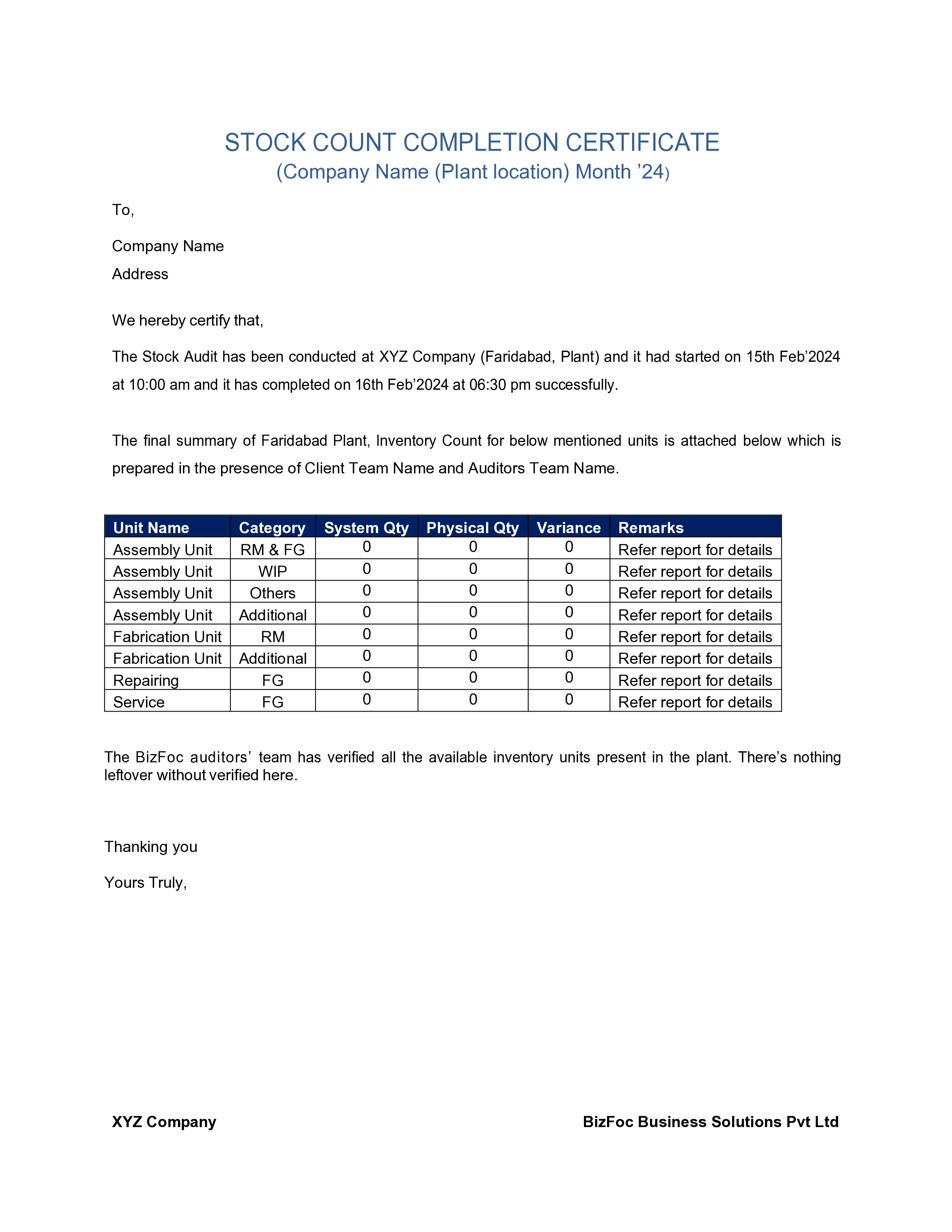Stock Audits are essential for e-commerce companies to keep correct inventory records and ensure operational efficiency. According to industry figures, up to 43% of small businesses face inventory shrinkage, which costs them an average of 1.45% in lost sales each year. Regular stock audit help businesses reduce losses due to theft and errors while also improving overall inventory management. Businesses can streamline this process by using stock audit services, which ensures openness and reliability in their stock management operations. Bizfoc is a leading stock auditor company in India with a stock audit for e-commerce team with more than 10 years experience in fixed asset, inventory verification.

E-commerce stock audit meaning includes but not limited to, professional assessment of a company's financial records to identify potential risks and difficulties. This includes evaluating accounting standards, stock analysis, and financial statements. Audits for stocks enable e-commerce businesses to establish compliance with applicable rules and regulations, as well as assess the correctness of their financial records. It also helps to identify operational concerns that could affect the profitability of e-commerce businesses. For business owners concerned about financial correctness, a trained accountant-prepared audit can provide the answers they need.
Stock audit checklist for e-commerce Businesses that is required to be followed for conducting an effective stock audit for e-commerce business is given below:
Some of the very basic documents required for the stock audit procedure for e-commerce are discussed or provided below:
The Stock Audit Procedure for e-commerce business involves the following steps:
It is vital to understand the auditing scope, inventory categories, locations, and auditable goods. The timeline for stock audit for e-commerce businesses must be established, taking into account the company's function schedule. Proper policies and procedures for performing such audits must be drafted. The pre-auditing procedure requires the scope and objective to be defined properly so that accordingly stock audit for e-commerce can be performed without any kind of discrepancies.
Make sure to complete the physical verification of all the inventories in the warehouses or any other storage properly and with due care and caution. Ensure that no mistakes are made while doing physical verification of the inventories. This is one of the crucial steps of the inventory audit procedure. After completing the verification, make sure to re-verify the same in order to avoid any kind of mistake.
After completing all the above steps for stock audit for e-commerce businesses, document everything after comparing both the physical as well as book inventory. This needs to be done in order to avoid any kind of ambiguity. Documentation includes all the details like recording of results of the auditing, recording discrepancies if any, observations of the auditor must be recorded properly, and lastly, prescribing the corrective measures.
Prepare a stock audit report for e-commerce detailing the findings from the stock audit, highlighting any irregularities discovered and providing suggestions for improvement. The report should include a summary for senior management, outlining key outcomes and recommending necessary actions. Make sure to follow the stock audit report format for e-commerce businesses properly.
Bizfoc is an accounting firm which is the best for stock audit for e-commerce because they have a team of experienced professionals who not only have experience in inventory auditing but also have expertise in various other business domains. They will make your work easy and smooth. Hence in order to make sure that your stock audit for e-commerce is done properly, choose Bizfoc.
Stock auditing, also called inventory auditing, is done to ensure the correspondence of stock registry findings with the presence of the physical commodities. Stock audit for e-commerce helps in rechecking of the company records with their physical count. The inventory audit helps in ensuring accuracy in the operations of the stock and helps in avoiding errors. The stock audit for e-commerce auditing companies involves the reviewing of the financial records of the company by professionals which helps in identifying risks and issues that may occur in the upcoming days. Stock audit for e-commerce is essential to ensure the actual presence of stocks in accordance with the company's records and to eliminate the problems before they become a bigger issue for the company or organization.
Audit for Stocks is done to check whether the stock findings correspond with the records of the company or not. It ensures the physical count of the commodities.
In order to review the accounts of businesses, ensuring inventory records match with the physical count, avoiding chances of errors in stock operations, etc., one needs inventory auditing.
In order to review the accounts of the businesses, identification and correction of potential risks and financial issues, help in understanding the finances and performance of the company, etc., e-commerce companies need such auditing.
It depends on the company to create audits or not. It is beneficial to conduct audits in e-commerce companies.
The operations of an auditing for stock in e-commerce companies are conducted and reviewed by professionals who help businesses in the identification of potential risks.
Define policies, objectives, and procedures, gather documents, allocate resources, conduct thorough physical verification and quality checks, document findings, and prepare comprehensive audit reports with analysis and recommendations.
During the audit, record date and auditor, count all items, note damaged stock, verify accuracy, document discrepancies, review procedures, summarize findings, recommend actions, ensure implementation, schedule follow-ups, address training and software effectiveness, manage supplier issues.
Such audits are required regularly for financial reporting accuracy, to prevent fraud, optimize operational efficiency, comply with regulations, support mergers/acquisitions, and ensure insurance coverage adequacy.
First complete the auditing for stock procedure and after which prepare the documentation. Lastly on the basis of these documentation you need to prepare a stock audit report.